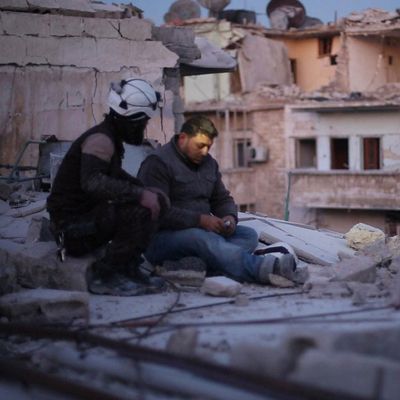
There are several shots of bombs falling from a great distance in the devastating and essential documentary Last Men in Aleppo, and they’re like blooming flowers, like wondrous sky paintings — they look, as Michael Herr wrote of similar sights in Vietnam in his book Dispatches, “so beautiful, so remote from anything that could harm you.” The difference in the film is that after the bombs fall, director Feras Fayyad follows a group of Syrian men, the “White Helmets,” some of the last people in a city that’s now rubble, to view the results on the ground. These men, whom we get to know over the next 90 minutes, are not rebel soldiers. They had, we’re told, “normal” jobs before the Assad government began its campaign against cities like Aleppo. Now they are, in effect, rubble divers. Occasionally they find a survivor. In an early scene, they pry huge blocks of concrete off a young boy with a bloodied head. He stirs, vaguely. They later learn that he died at the hospital. They pull out pieces of bodies, limbs. They pull out dead babies covered in dust, one in striped pajamas. My defenses were up — way up — in preparation for the sight of dead children. But the pajamas broke through them. There is no worse sight in this world.
Fayyad shows us these things but does not linger on them, even if to do so could be morally justified. The camera does not, for example, tilt down to show a severed leg or the feet that might be the last remains of one searcher’s relative. In time, the anticipation is as awful as the awful sights. Some of the White Helmets have families and, for various reasons — the hell of life as refugees in a world that doesn’t want them, a fierce commitment to bearing witness and keeping their city from extinction — try to rebuild. A key symbol is a concrete goldfish pond that the film’s protagonist assembles in the hope that if the food runs out entirely, there will still be a source of protein. (Maybe he could make a little money, too.) But then they’ll hear the warning sirens and see the planes — some of them Russian — in the distance and the process of taking shelter and, later, collecting body parts will begin again. Those swimming goldfish are the subjects of the movie’s overture, which is solemn and portentous, as in Kubrick’s A Clockwork Orange or Barry Lyndon, and doesn’t entirely work — it’s a little arty. But the longing for normalcy and beauty hits home.
The White Helmets do not talk about religion or ideology. It’s not clear if they have no burning thoughts in that area, if those thoughts have been burned out of them, or if Fayyad has left them out in hopes of finding a broader audience. What they say is along the lines of, “Why don’t our Arab neighbors help our people?” “Where is the world, man?” “Shame on the Arab leaders. Just shame.” The talk is moving but it’s the weirder, less predictable elements that catch you up. Families nervously gather on a playground, aware that large gatherings are magnets for Assad’s bombers. The kids are in heaven — toys, candy, swings, those appetites transcend places and times. But an onlooker says of the fathers, “They’re using their kids as an excuse to play.”
A cool, objective film critic could complain that Last Men in Aleppo becomes repetitious, but it’s that repetition that eats into your mind and makes objectivity foolish. To sit with them and then hear again those bombers, blow after blow after blow — that’s the point. A few weeks ago I watched the stilted epic The Promise, in which the Turks began their wanton massacre of Armenians and the Armenians spoke of somehow getting to Aleppo, Syria. Here some Syrians speak longingly of crossing the border into Turkey. Write your own caption to that — it’s beyond me.
This New Yorker saw from a distance the World Trade Center towers come down and is still traumatized by that sight. Imagine seeing that every day. Imagine trying to become inured to it, simply to survive. In his 2006 film World Trade Center, Oliver Stone tried to instill hope by focusing on two American firemen rescued from under the rubble. To attempt to frame the same story in the context of Aleppo would be obscene. (Remember Gary Johnson, a major presidential candidate? “Aleppo — what’s that?”) You should — you must — see Last Men in Aleppo to witness an ongoing tragedy. But you should also see it to learn humility. We — meaning Americans — ain’t seen nothin’. Yet.





